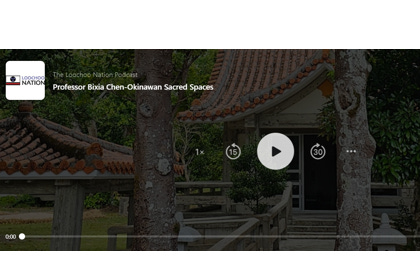Nifē dēbiru to Dr. Chen for the yuntaku!
In this episode, Dr. Bixia Chen shares her fascinating journey from growing up in rural Fujian, China, to studying and settling in Okinawa. She explains how her background in Marxist economics and English teaching led her, unexpectedly, into researching Okinawan sacred spaces, known as utaki, and the cultural significance of feng shui in shaping local villages. We learn how these sacred sites are at the core of Okinawan spiritual life—places where ancestors are venerated, deities are invited during festivals, and the landscape itself is carefully designed to offer protection from harsh elements.
She also sheds light on the role of noro priestesses, the unique blend of Chinese, Southeast Asian, and indigenous influences on island customs, and why local communities prefer to keep their utaki private rather than turn them into tourist attractions. Along the way, we hear about the importance of fukugi windbreaks, the subtle differences between utaki and ashagi structures, and the challenges of preserving traditional rituals in modern times. This conversation offers a window into Okinawa’s harmonious interplay of nature, culture, and spirituality—one that continues to adapt while striving to protect its deeply rooted heritage.
Dr. Bixia Chen, born in April 1975 in Putian, Fujian Province, China, is a researcher and educator in landscape ecology, with a specific focus on East Asian rural landscapes and the conservation of Fukugi windbreak forests in Okinawa. Dr. Chen graduated with a Bachelor of Arts in English Education from Fujian Normal University in 1996 and later earned a Master of Economics from the same institution in 2001. She pursued further studies in Japan, receiving her Master’s degree in Agricultural Science from the University of the Ryukyus in 2005, followed by a Doctorate in Agriculture from Kagoshima University in 2008.
Dr. Chen has held various academic and research positions, including roles as a lecturer at Fujian Normal University and a postdoctoral researcher at United Nations University. Since December 2013, she has been an assistant professor and then associate professor in the Faculty of Agriculture at the University of the Ryukyus, where her research focuses on traditional village landscapes and the ecological roles of homestead windbreaks.
Her work has been widely recognized, with honors including the Japan Coastal Forest Society Award in November 2018, and the Okinawa Research Encouragement Award in January 2024. Dr. Chen has authored over ten books and published more than 80 research papers, contributing extensively to the understanding and preservation of cultural landscapes in East Asia. Notable publications include Traditional Rural Landscapes in Island Topography in East Asia (2012) and Fukugi Avenues of the Ryukyu Archipelago (2023).
Dr. Chen can be contacted at:
Office Phone: 098-895-8773
Email: chenbx@agr.u-ryukyu.ac.jp
Chen, B. Utaki and Ashagi: Sacred forests in the Ryukyu Islands: https://bit.ly/4jcIV2x
Additional show notes (community work in progress): https://bit.ly/3W99SKP
We’d also like to extend our heartfelt gratitude to Harikuyamaku from Uchinā, Loochoo, for granting us access to his beautifully remixed timeless tracks from the Mystic Islands Dub album. His soulful music adds a unique touch to our podcast, enriching the listening experience for all of you. Nifē dēbiru, Harikuyamaku!
Anigama: https://buff.ly/46SHy3g
Nachijin-myahkunii: https://buff.ly/3AtfLdU
Instagram: https://buff.ly/46ThVzq
Mystic Islands Dub album: https://buff.ly/4e9irMn
Connect with us: https://bit.ly/49sRWQD










Share this post